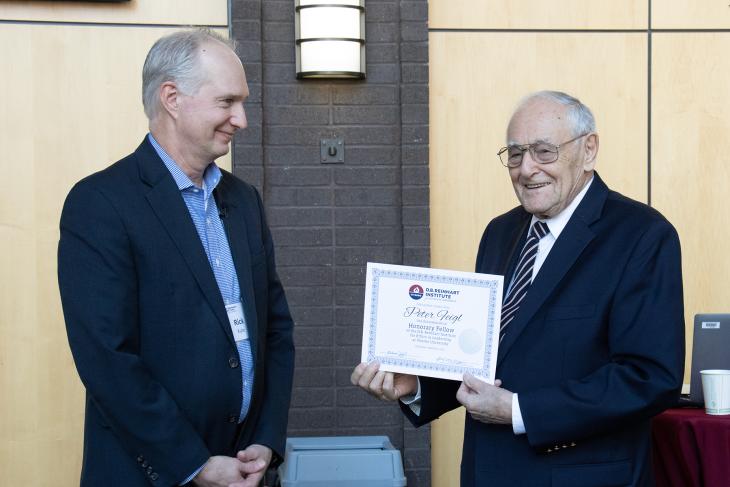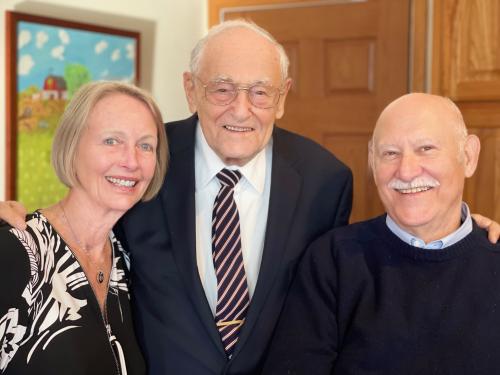As part of their unit on the Holocaust, seventh grade students in La Crosse Lincoln Middle School teacher Scott Bagniefski’s class read aloud and discuss various Nuremburg laws before placing each one on a timeline. This allows the students to see the gradual progression of the Nazi persecution of Jews using the German legal system in the years leading up to the Holocaust.
The timeline is one of the classroom lesson ideas Bagniefski received at Viterbo University’s Teaching the Holocaust Workshop. He and fellow Lincoln Middle School teacher Tim Sprain have attended the annual two-day workshop for more than a decade.
“It is by far the best conference I’ve ever attended in my 29 years of teaching,” Bagniefski said. “I learn so much every year, and it affirms what I’m teaching in the classroom.”
A leader in Holocaust education, the School District of La Crosse added the subject to its middle school curriculum more than a dozen years ago. Wisconsin Act 30, which became law in 2021, requires the teaching of the Holocaust and other genocides in grades 5–8 and 9–12 in state public and charter schools.
“The workshop covers what is age-appropriate subject matter for big topics like this,” Sprain said. “For middle school, we’re covering what led up to the Holocaust under the larger lesson of preventing anything like this from happening again.”
The highlight of their studies was a personal message and interaction with Holocaust survivor Peter Feigl, who shared a message and interacted via video with all Lincoln seventh and eighth grade students.
“For the students, this was not a book or story, but a real person,” Bagniefski said. “The students were completely engaged and very serious and adult-like with the questions they asked because they knew they were talking to someone who lived it.”
Feigl also held a question and answer session with workshop participants and spoke to a capacity Viterbo Fine Arts Center Main Theatre audience as part of the university’s D.B. Reinhart Institute for Ethics in Leadership spring lecture series. His presentation continued the tradition of Holocaust survivors speaking at Viterbo that began in 2005.
Started in 2007, the Viterbo Teaching the Holocaust Workshop has grown to a two-day event and features leading Holocaust education expert Stephen Feinberg and other presenters. Feinberg worked at the U.S. Holocaust Memorial Museum in Washington, D.C., for 15 years and was responsible for the development and implementation of the Museum Teacher Fellowship Program.
Seventy-three people took part in this year’s workshop, and more than 800 from six states have participated since its inception. People from all walks of life attend (not just educators), and many come every year.
The annual workshop was founded and is led by Darryle Clott, a retired La Crescent High School English teacher and Viterbo University adjunct faculty member who has personally dedicated herself to providing outstanding Holocaust education and bringing Holocaust survivors to La Crosse to share their incredible stories and inspiring messages firsthand. Nobel Peace Prize winner Elie Wiesel and Presidential Medal of Honor winner Gerda Weissmann Klein are just two of many Holocaust survivors she was instrumental in bringing to the community since 2002 to speak to the public and area students.
“Educators aren’t taught how to teach the Holocaust in college, and I think it’s very important to do so,” said Clott, who has been honored with numerous awards, including the Ellis Island Medal of Honor for her efforts. “The workshop presenters put their hearts and souls into their presentations, and everyone is so inspired and uplifted by the survivors. Workshop evaluations are off the charts. We’re so blessed to be able to do this.”
Teaching the personal accounts and stories of Holocaust survivors and those who didn’t survive is a key aspect that makes the important lessons more relatable to students, Clott said.
“When kids are interested and excited to learn, you know you’re doing something right,” she said. “We can use the Holocaust as a backdrop to teach people to respect each other’s differences. We can teach against bullying and how to get involved and intercede. It’s important that we all be upstanders and not bystanders when we see injustice occur.”
“When I reflect on the many Holocaust survivors who have blessed us by coming to our area to share stories of personal loss, inspiration, and the strength to survive despite overwhelming odds, I am truly humbled,” she said.
Ruth Busalacchi attended the workshop for a slightly different reason than most educators—she was invited to be a presenter. The Menomonee Falls sixth-grade social studies teacher had been teaching her students about the Holocaust using diary and other primary sources from young people who experienced the events of the time. One of the survivor stories they discovered was Feigl’s.
Last year, learning Feigl was still alive at the age of 93 and would be speaking at Viterbo, Busalacchi and her students sent him a package filled with letters, cards, and art pieces.
“We wanted to honor this amazing man and his harrowing escape to freedom,” Busalacchi said. “Then the unthinkable happened—he called me at school and offered to set up a Zoom call with my kids. I was stunned. It was the teaching moment of a lifetime.”
Feigl would spend 30 minutes via Zoom with 97 students of the Menomonee Falls sixth grade, sharing his story and answering questions.
“Words can’t explain the experience,” said Busalacchi, who gave a presentation about it and her teaching at this year’s Teaching the Holocaust Workshop. “Peter is such a brilliant man, yet that pales in comparison to his graciousness. Our students were very honored by his gift of time he spent with them.”
Feigl was unable to speak at Viterbo in 2022 due to illness but made the trip to La Crosse this year instead.
“The entire workshop was riveting,” Busalacchi said. “For me, it was a personal and professional ‘game-changer.’ The knowledgeable speakers and great teaching strategies inspired us to teach the Holocaust experience in a more informed and engaging way that will encourage students to do more reading and research on their own.”
Busalacchi will take what she learned at the workshop and “up her game” as a Holocaust educator.
“The children’s book Peter’s War tells the story of Feigl’s survival in Europe from his birth to his salvation in 1944,” she said. “I am going to take this story and create a ‘reader’s theater’ script, to share with our entire sixth grade. The students will be able to read, research, and partake in this experience through drama. This is an art form I consider to be one of the premiere methods in engagement and understanding through the expression of the student voice. I’m excited for the kids.”
For more information, visit the Teaching the Holocaust Workshop webpage.

